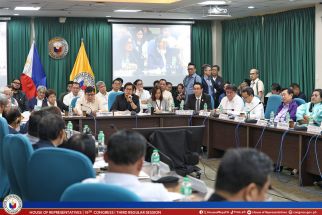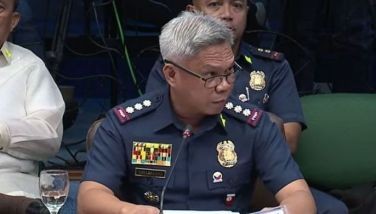Senate-House gridlock forcing Pinoys to favor Cha-cha — survey
August 16, 2006 | 12:00am
The number of Filipinos supporting Cha-cha or Charter change continues to increase because of the gridlock between the Senate and the House of Representatives that has stalled lawmaking and jeopardized approval of legislation vital to economic development, a survey showed.
The Center for Issues and Advocacy said a public opinion poll involving 840 respondents nationwide from July 24 to 31, 2006 showed a high 49 percent of respondents that agreed when asked, "Do you agree or disagree, with the proposal to amend, change or alter the 1987 Philippine Constitution?"
The survey showed only 42 percent said they disagreed while nine percent of respondents were undecided. The Center said the survey had a margin of error of plus or minus 1.8 percentage points.
Forty-eight percent of respondents said that if the Charter is changed or amended, they favored the proposal to adopt a parliamentary government and a unicameral legislature to replace the present US-style presidential system with two chambers of Congress.
The number of respondents who said they did not favor it was at 41 percent, nearly a two-percent drop from the last opinion poll taken in early July. Eleven percent of respondents were undecided.
The shift in the system of government registered the highest approval rating in Mindanao at 56 percent, followed by Luzon (47 percent), Visayas (46 percent) and Metro Manila (43).
Raul Lambino, spokesman for the pro-Cha-cha Sigaw ng Bayan Movement, welcomes the people’s "overwhelming acceptance" of Charter change, confident of their campaign’s success.
"On the eves of the filing of our petition with the Commission on Elections, this survey bolsters our position that Filipinos now want to shift the country to a unicameral parliamentary government," said Lambino, referring to their people’s initiative calling for amendments to the Constitution now pending with the Commission on Elections.
"We expect this position to solidify upon the filing of our petition with the Comelec," he said.
Opponents of the people’s initiative argue that the Supreme Court had ruled in 1997 that an enabling law is needed to carry out a people’s initiative.
The Center added it found a "marked consistency" in favor of amending the Constitution and a change in the form of government to parliamentary system with a unicameral legislature.
"This growing clamor for a shift from the present bicameral system to a unicameral parliamentary form of government was very much evident not just among the intellectually gifted section of society but also among those whose political views were not given much importance in the past," the Center said.
"The preponderance of public opinion against the legislative gridlocks emanating from the seeming failure of the Philippine Senate to address the important bills that have remained pending in its august halls also spawned the emerging bias in favor of a shift to a parliamentary form of government with a unicameral assembly," it explained.
The Center added that many respondents look at the legislative standstill as an obstruction that has contributed to the economic deprivation they now experience especially in the countryside. The failure of Congress to pass the government’s 2006 budget has "created an impact on the people’s political mindsets."
It said further there is a rising awareness among the lower classes on Charter change and the shift to a parliamentary system and unicameral legislature sparked by the series of public forums organized by the Union of Local Authorities of the Philippines, the Advocacy Commission and Sigaw ng Bayan.
Even the political opposition organized its own forums, thus creating greater public awareness about amending the Constitution, the Center said.
The Center also noted the support given by major business groups such as the Philippine Chamber of Commerce and Industry, and the country’s largest labor group, the Trade Union Congress of the Philippines.
President Arroyo wants to amend the Constitution and replace the country’s US-style presidential form of government with a parliamentary system, which she said would speed up the passage of legislation needed for economic recovery.
Under the current system the executive branch of government must engage in lengthy debates and lobbying with two chambers of Congress — the Senate and the House of Representatives — before a bill can be passed.
A federal system has also gained favor among provincial governments who have long been dissatisfied over the dominance of "Imperial Manila."
Opponents say economic reforms and endemic corruption should be addressed first, adding that a parliamentary system needs strong parties to work properly — something the Philippines’ personality-driven politics notably lacks.
Article 17 of the Constitution provides three methods for making amendments: through a constituent assembly, a constitutional convention or a people’s initiative.
The Center for Issues and Advocacy said a public opinion poll involving 840 respondents nationwide from July 24 to 31, 2006 showed a high 49 percent of respondents that agreed when asked, "Do you agree or disagree, with the proposal to amend, change or alter the 1987 Philippine Constitution?"
The survey showed only 42 percent said they disagreed while nine percent of respondents were undecided. The Center said the survey had a margin of error of plus or minus 1.8 percentage points.
Forty-eight percent of respondents said that if the Charter is changed or amended, they favored the proposal to adopt a parliamentary government and a unicameral legislature to replace the present US-style presidential system with two chambers of Congress.
The number of respondents who said they did not favor it was at 41 percent, nearly a two-percent drop from the last opinion poll taken in early July. Eleven percent of respondents were undecided.
The shift in the system of government registered the highest approval rating in Mindanao at 56 percent, followed by Luzon (47 percent), Visayas (46 percent) and Metro Manila (43).
Raul Lambino, spokesman for the pro-Cha-cha Sigaw ng Bayan Movement, welcomes the people’s "overwhelming acceptance" of Charter change, confident of their campaign’s success.
"On the eves of the filing of our petition with the Commission on Elections, this survey bolsters our position that Filipinos now want to shift the country to a unicameral parliamentary government," said Lambino, referring to their people’s initiative calling for amendments to the Constitution now pending with the Commission on Elections.
"We expect this position to solidify upon the filing of our petition with the Comelec," he said.
Opponents of the people’s initiative argue that the Supreme Court had ruled in 1997 that an enabling law is needed to carry out a people’s initiative.
The Center added it found a "marked consistency" in favor of amending the Constitution and a change in the form of government to parliamentary system with a unicameral legislature.
"This growing clamor for a shift from the present bicameral system to a unicameral parliamentary form of government was very much evident not just among the intellectually gifted section of society but also among those whose political views were not given much importance in the past," the Center said.
"The preponderance of public opinion against the legislative gridlocks emanating from the seeming failure of the Philippine Senate to address the important bills that have remained pending in its august halls also spawned the emerging bias in favor of a shift to a parliamentary form of government with a unicameral assembly," it explained.
The Center added that many respondents look at the legislative standstill as an obstruction that has contributed to the economic deprivation they now experience especially in the countryside. The failure of Congress to pass the government’s 2006 budget has "created an impact on the people’s political mindsets."
It said further there is a rising awareness among the lower classes on Charter change and the shift to a parliamentary system and unicameral legislature sparked by the series of public forums organized by the Union of Local Authorities of the Philippines, the Advocacy Commission and Sigaw ng Bayan.
Even the political opposition organized its own forums, thus creating greater public awareness about amending the Constitution, the Center said.
The Center also noted the support given by major business groups such as the Philippine Chamber of Commerce and Industry, and the country’s largest labor group, the Trade Union Congress of the Philippines.
President Arroyo wants to amend the Constitution and replace the country’s US-style presidential form of government with a parliamentary system, which she said would speed up the passage of legislation needed for economic recovery.
Under the current system the executive branch of government must engage in lengthy debates and lobbying with two chambers of Congress — the Senate and the House of Representatives — before a bill can be passed.
A federal system has also gained favor among provincial governments who have long been dissatisfied over the dominance of "Imperial Manila."
Opponents say economic reforms and endemic corruption should be addressed first, adding that a parliamentary system needs strong parties to work properly — something the Philippines’ personality-driven politics notably lacks.
Article 17 of the Constitution provides three methods for making amendments: through a constituent assembly, a constitutional convention or a people’s initiative.
BrandSpace Articles
<
>
- Latest
- Trending
Trending
Latest
Trending
Latest
Recommended






























